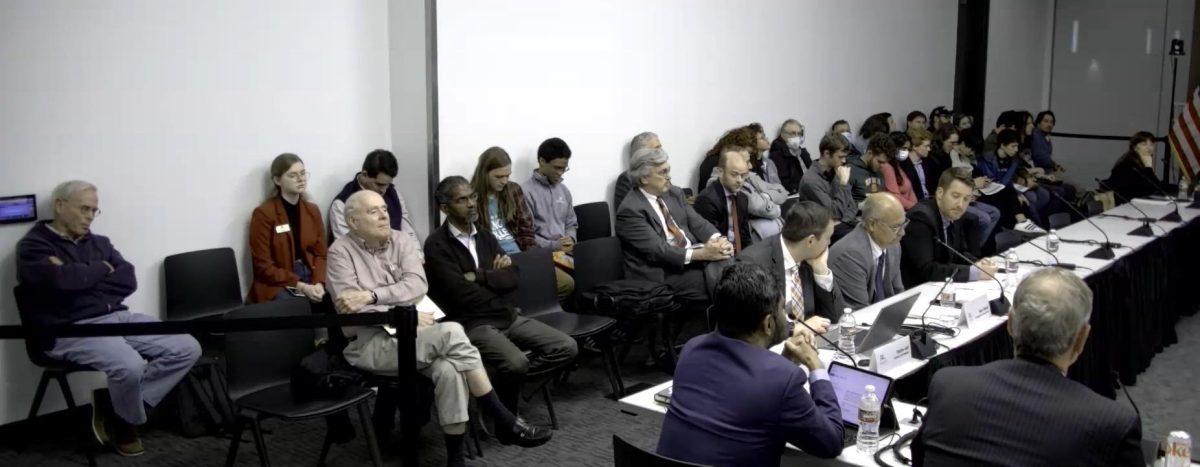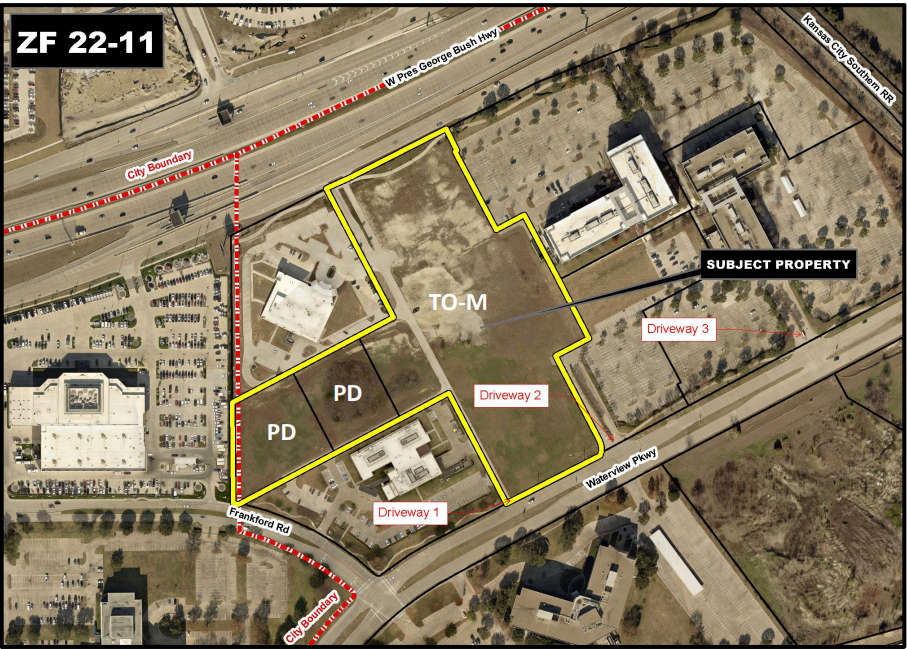The Richardson city council on Dec. 12 voted in favor of a zoning change that paves the way for a housing development near campus that could feature up to 511 apartment units.
The city council voted unanimously in favor of a zoning change that would allow for the construction of a multi-use student-oriented housing complex between Waterview Parkway and President George Bush Highway just north of campus. The proposed complex is within 0.75 mile of UTD and will have a shuttle to campus. Phase one includes 171 units of student-focused housing with 529 bedrooms in total. Phase two includes a hotel, up to 19,000 square feet of retail space and 340 more apartment units with 450 beds total. Developers did not provide a specific timeline for when the complex’s construction will begin.
Plans for the development have gone through several iterations, all of which were rejected by prior city councils. Mayor Paul Voelker said he was reluctant to change the original phasing requirements because if the current owner were to sell, the restrictions on the land would make it less marketable.
“And so why I was so insistent upon phasing this was to make sure we executed the broader plan development as approved by council so that we could ensure that that land doesn’t sit empty for at least 10 more years, because I want it to be productive,” Voelker said.
Six UTD students spoke at the meeting in support of the development. Griffin Davis spoke on behalf of Student Government in support of the zoning file.
“Today, we can set the record straight that Richardson is not gonna stand in the way of investors and groups that want to build stuff for us,” Davis said. “We don’t want to send the wrong message here. So please approve this zoning file.”
Comets for Better Transit vice president Chandu Garapaty said that the group’s petition had responses from 277 students in support of the development, which would alleviate UTD’s housing shortage. In spring 2021, 2,325 students signed up for on-campus housing but only 1,717 beds were available. Computer science student David Wank described how he has lived in a different apartment every semester at UTD, and his savings dwindled as housing became scarcer. In spring 2021, Wank’s application for on-campus housing was denied.
“I spent four months spending about an hour a day on Zillow seeking the perfect lease I could afford and still reach campus with,” Wank said. “That lease did not exist. What followed was pretty unpleasant. I lost thousands of dollars … but my housing period has stabilized ever since I had the incredible luck of receiving one unit in our extremely scarce housing supply, and I can even fit in my budget. I’m here to encourage you all to vote in favor of this proposal that will grant others the same luck I had.”
Although the council voted unanimously in favor of the zoning change, several council members expressed frustration about a late change in the development proposal. An earlier negotiated plan would require construction of phase two to be underway before a certificate of occupancy would be granted for phase one, ensuring that both plots would be developed. However, at the Dec. 12 meeting, Barry Hand – a partner at Gensler architecture firm – suggested that both phases be available for student housing in order to make the project more financially sound. The council ultimately rejected the new plan and voted in favor of the original plan.
Councilman Joe Corcoran raised concerns over whether the new plan could oversaturate the housing market, a situation that Hand said was unlikely. Similar concerns were raised in response to a former iteration of the complex at a city council meeting on December 14, 2020. At the 2020 meeting, Calvin Jamison – UTD’s vice president of facilities and economic development – shared his thoughts in a letter of opposition, which emphasized that UTD had increased its housing capacity from 2,500 to 8,100 beds by fall of 2021 partly through partnership with Balfour Beatty, the owner of Northside.
Jamison’s letter cited many reasons for opposition, particularly the complex’s branding as “UTD Student Housing Village” despite the lack of a partnership between the development and UTD. Jamison’s letter also raised concerns over the safety of students crossing Waterview Parkway. Jamison said that while 8,000 housing units were available to students, capacity had not been reached due to COVID-19, and many UTD students choose to commute to campus.
“When creating plans for UT Dallas students, it is of the utmost importance that all parties work together to ensure all entities can be successful … ” Jamison said. “We recommend in the strongest terms that UT Dallas should be able to focus on filling the existing and upcoming housing that has already been planned, approved and supported both by the university as well as its surrounding communities and homeowner’s associations.”
At the December 2020 meeting, Doug Tomlinson, associate vice president of facilities management at UTD, said the oldest phases of UV go back to the late 1980s. Similar to projections from CBRE real estate, the lifespan of “garden style” apartment buildings like UV is estimated at 30 years. Since the 2020 city council meeting, the only housing UTD has built is the Northside+ apartments, which are the most expensive option for students. It is unclear whether UTD’s position on the development has changed since Jamison’s December 2020 letter. Jamison did not respond to emails requesting comment on the city council’s recent decision.
At the December 2022 council meeting, Voelker said he had been monitoring the master plan for decades and UTD’s unprecedented population boom. He said that he appreciated student input and encouraged students to stay involved.
“I would ask questions to the university, what’s a reasonable waitlist? Because the waitlist is, remember, student housing for the university,” Voelker said. “So in that plan, ask. I don’t know the answer to that. Is it, you know, five people? 500 people? One thousand? … I’m gonna ask the same questions. I’m not asking you to carry the water for me. But understand, these are important topics for the university to answer.”






